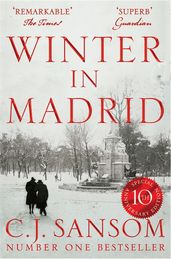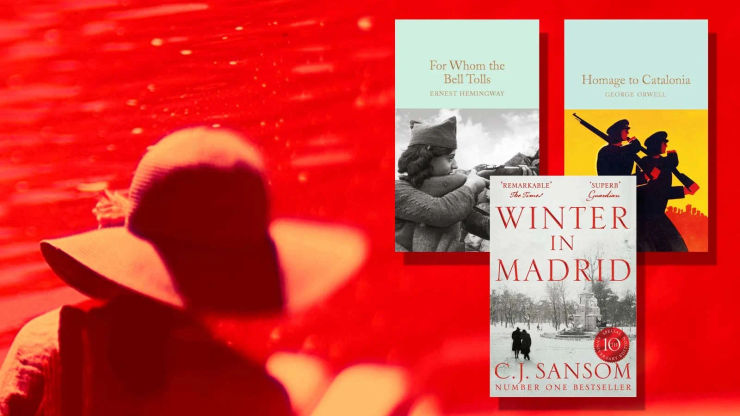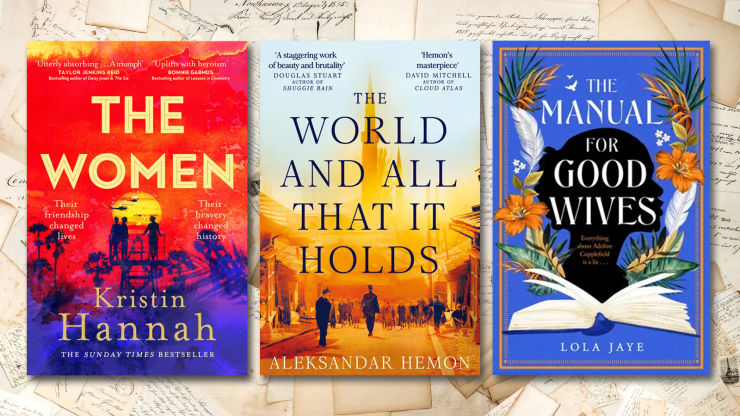C.J. Sansom on writing the Spanish Civil War
C.J Sansom, author of the Shardlake series, reflects on the conflict that inspired his bestselling Spanish Civil War thriller Winter in Madrid.

C.J Sansom, author of the Shardlake series, reflects on the conflict that inspired his bestselling Spanish Civil War thriller Winter in Madrid.
Eighty years after its end, the Spanish Civil War remains controversial. In the early years of the twentieth century, Spain's oligarchmonarchist regime faced increasing resistance from middle-class Republican reformers, Catalan and Basque regionalists and above all from the impoverished working classes, rural and urban. A cycle of resistance and oppression fed a class struggle and polarization unique in Europe outside Russia.
In 1931 King Alfonso XIII abdicated and the Second Republic was proclaimed. A succession of unsuccessful governments, first liberal-socialist and then conservative, followed until in 1936 a radical left-wing coalition was elected to power. Working people began taking matters into their own hands, seizing control of estates and local institutions.
Whether the Popular Front government could have succeeded will never be known, for in 1936 the long-feared military rising, supported by conservative forces and with major financial support from Juan March, took place. The initial coup failed, however: many officers remained loyal to the elected government and in the largest cities the rising was defeated. The insurgents were left in control of only a little over a third of mainland Spain, and none of its industrial regions.
It is possible that without foreign intervention the rising might have been entirely defeated, but Hitler and Mussolini immediately sent planes to General Franco, enabling him to airlift crack troops from Spain's Moroccan colony to the mainland and begin his march on Madrid. Meanwhile, the Conservative-dominated British government pressured France into denying aid to the Republic and closing the border. As a result, the Republic was forced to turn to the only power willing to help them, the Soviet Union. The Republican zone became dependent on Stalin and his ‘advisers', who exported his apparatus of terror as well as weapons.
There is still a myth in Spain, fostered by the Franco regime, that the army rose to forestall a communist coup, but the Spanish Communist Party before 1936 was tiny and the tradition among Republicans, Socialists and Anarchists was strongly anti-authoritarian. The Communists' rise to power was a direct consequence of Britain's pressure on France to stay clear of involvement in the conflict.
The bloody civil war that followed lasted for three years and ravaged Spain. Perhaps 250,000 died in combat and another 200,000 in the campaign of terror waged by both sides, many of them apolitical people with ‘suspect loyalties' who happened to end up on the wrong side of the lines.
When the war ended with Franco's victory in April 1939, there was no reconciliation, only continued executions and disappearances as Franco sought to ‘cleanse' Spain. The 1940s, for most Spaniards, were scarcely less of a nightmare than the Civil War years as the effects of drought were worsened by the ruin of much of the infrastructure in the war, Franco's fascist economic policy of self-sufficiency, and the chaotic, corrupt distribution system. Franco himself fantasized about solutions such as giant gold reserves and manufacturing oil from grass.
The Franco regime itself was divided from the start between the Fascists of the Falange, whose armed bands Franco had co-opted during the Civil War and who became Spain's only political party, and the Monarchists, traditional Spanish conservatives. The Monarchists were often pro-English and anti-German, but the England they admired was that of the aristocratic country house; they despised the Falangists as ‘common' and had, if anything, even less sympathy with the sufferings of ordinary Spaniards than the Falange.
In the Civil War they were no less violent. Franco himself stood somewhere in the middle; a skilful political tactician, his ability to balance the factions that made up his regime helped keep him in power for nearly forty years. After the defeat of Hitler, however, the Falange were always a junior partner in his coalition.
In 1939–40 the main question before Franco was whether to enter the war on Hitler's side, as the Falange wanted. Franco himself had dreams of carving out an expanded Spanish African empire from the colonies of defeated France, but the Monarchists wanted to stay neutral, regarding entry into the war as a risky venture as well as one that would consolidate Falange power.
In the end, as usual, Franco's position was pragmatic. The son of a naval officer, he knew the power of the British navy, which was blockading Spain and could turn off supplies easily. Therefore he would only join the war if and when Britain was almost defeated. When this seemed to have happened in June 1940 he made overtures to Hitler, but the Führer's reply was cautious. By autumn 1940, when Hitler wanted Franco in mainly so that Gibraltar could be taken, the Battle of Britain had ended in German defeat and Franco realized that Britain was far from finished.
The meeting between Hitler and Franco on the French–Spanish border in October 1940 remains a focus for argument. Franco's apologists contend that his skilful diplomacy kept Spain neutral; his opponents argue he would have entered the war if the terms were right.
I think the latter view is correct; but by the autumn of 1940, the amount of German aid Franco would have needed to prevent a British blockade driving Spain into starvation and perhaps renewed revolution was impossible for Hitler to provide.
Franco's persistent demands resulted in the Führer leaving the Hendaye meeting in disgust. Thereafter negotiations between Franco and the Axis continued but any real prospect of Spain's entering the war receded, thanks to the Royal Navy's continued control of the seas.
In May 1940 Churchill, Prime Minister of Britain's new wartime coalition, sacked Sir Samuel Hoare from the Cabinet and sent him to Spain as Ambassador on Special Mission with a brief to keep Franco out of the war. Hoare had been a Conservative minister since 1931 and a leading appeaser. Vain, effete and arrogant, but a skilful administrator and politician, Hoare's abilities, status and history of soothing dictators made him a shrewd choice, though he was disappointed not to achieve his long-held ambition of becoming Viceroy of India.
Churchill neither liked nor trusted Hoare, and may have chosen his friend Alan Hillgarth as officer in charge of covert operations in Spain (including the bribery of potentially sympathetic Monarchists) partly to keep an eye on Hoare. Certainly Hillgarth reported directly to Churchill.
As ambassador, during the autumn and winter of 1940–1, Hoare followed a predictable path. Franco and his chief minister, the pro-Falange Serrano Suñer, treated him with disdain but he managed to build links with the Monarchists and to obtain important information from them. He was insistent that (apart from bribery) covert activities in Spain be limited to intelligence gathering; there were to be no SOE men ‘setting Europe ablaze' and he rebuffed approaches from the underground left-wing opposition, arguing that Franco's was the established government and all Britain's efforts should be concentrated there.
That seems to me a poor argument: the threat of support for the opposition would surely have added another string to Britain's bow. But Hoare's outlook, like that of many British conservatives, was emotionally sympathetic to the aristocratic, anti-revolutionary Monarchists. Hoare argued successfully for a policy of having no truck with the Spanish left, thus sowing the seeds of the postwar Allied policy of leaving the Franco regime in place.
Hoare's views, however, changed as the war progressed and by the time his ambassadorship ended in 1944 he had become a vigorous opponent of leaving the Franco regime in place after the war, arguing for a programme of propaganda and economic sanctions. The thinking of Churchill, however, had evolved in the opposite direction. He had come to believe that Franco was a bulwark against Communism and should be left in place. Hoare was unable to shake Churchill's view, which in the end was decisive.
My interpretation of Hoare's and Hillgarth's characters is my own; it may seem harsh but is, I think, in accord with the known facts. All the other British and Spanish characters are fictional, except for some of the major figures of Spanish history in those years who make brief appearances: Azaña, the bizarre Millán Astray, and of course Franco himself.
The picture I have painted of Spain in 1940 is a grim one, but it is based largely on accounts by contemporary observers. The camp outside Cuenca is fictitious, but there were many real ones. I do not think my picture of the Spanish Church at the period is unfair; they were involved root and branch with the policy of a violent regime in its most brutal phase and those like Father Eduardo who found it hard to square their consciences seem to have been few and far between.
General Franco's archaic vision of an authoritarian, Catholic Spain died with him in 1975. Spaniards immediately turned their backs on his legacy and embraced democracy. The past was forgotten in the ‘pacto de olvido' – the pact of forgetting. Perhaps that was the price of a peaceful transition to democracy.
Only now, as the 1940s generation passes away, is that changing and Spanish historians are looking at the early years of the Franco regime once more, uncovering many new stories of horror that will be of little comfort to the regime's apologists but remind us of what ordinary Spaniards endured, not only during the Civil War, but after it was won.
Winter in Madrid
by C. J. Sansom
1940: Madrid lies ruined, its people starving, while the Germans continue their relentless march through Europe.
Into this uncertain world comes Harry Brett: a traumatised veteran of Dunkirk turned reluctant spy for the British Secret Service. Sent to gain the confidence of old schoolfriend Sandy Forsyth, now a shady Madrid businessman, Harry finds himself involved in a dangerous game - and surrounded by memories.
A vivid and haunting depiction of wartime Spain from the bestselling author of the Shardlake series.



